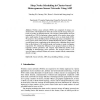Free Online Productivity Tools
i2Speak
i2Symbol
i2OCR
iTex2Img
iWeb2Print
iWeb2Shot
i2Type
iPdf2Split
iPdf2Merge
i2Bopomofo
i2Arabic
i2Style
i2Image
i2PDF
iLatex2Rtf
Sci2ools
161
click to vote
ICESS
2007
Springer
2007
Springer
Sleep Nodes Scheduling in Cluster-Based Heterogeneous Sensor Networks Using AHP
Abstract. Wireless sensor networks (WSNs) are comprised of energy constrained nodes. This limitation has led to the crucial need for energy-aware protocols to produce an efficient network. The concept of heterogeneity has been introduced in a WSN by deploying a large number of low power sensor nodes and a small number of more powerful nodes to serve as cluster heads (CHs). We propose a sleep scheduling scheme for balancing energy consumption rates in low power sensor nodes based on Analytical Hierarchy Process (AHP). We consider three factors contributing to the optimal nodes scheduling decision and they are the distance to CH, residual energy, and sensing coverage overlapping, respectively. We evaluate the efficiency of our proposed scheme in terms of important network parameters and compare with traditional random sleep scheduling in heterogeneous sensor networks. The proposed scheme is observed to improve network lifetime and conserve energy without compromising desired coverage.
Energy Constrained Nodes | ICESS 2007 | Low Power Sensor | Power Sensor Nodes | Software Engineering |
Related Content
| Added | 08 Jun 2010 |
| Updated | 08 Jun 2010 |
| Type | Conference |
| Year | 2007 |
| Where | ICESS |
| Authors | Xiaoling Wu, Jinsung Cho, Brian J. d'Auriol, Sungyoung Lee |
Comments (0)

